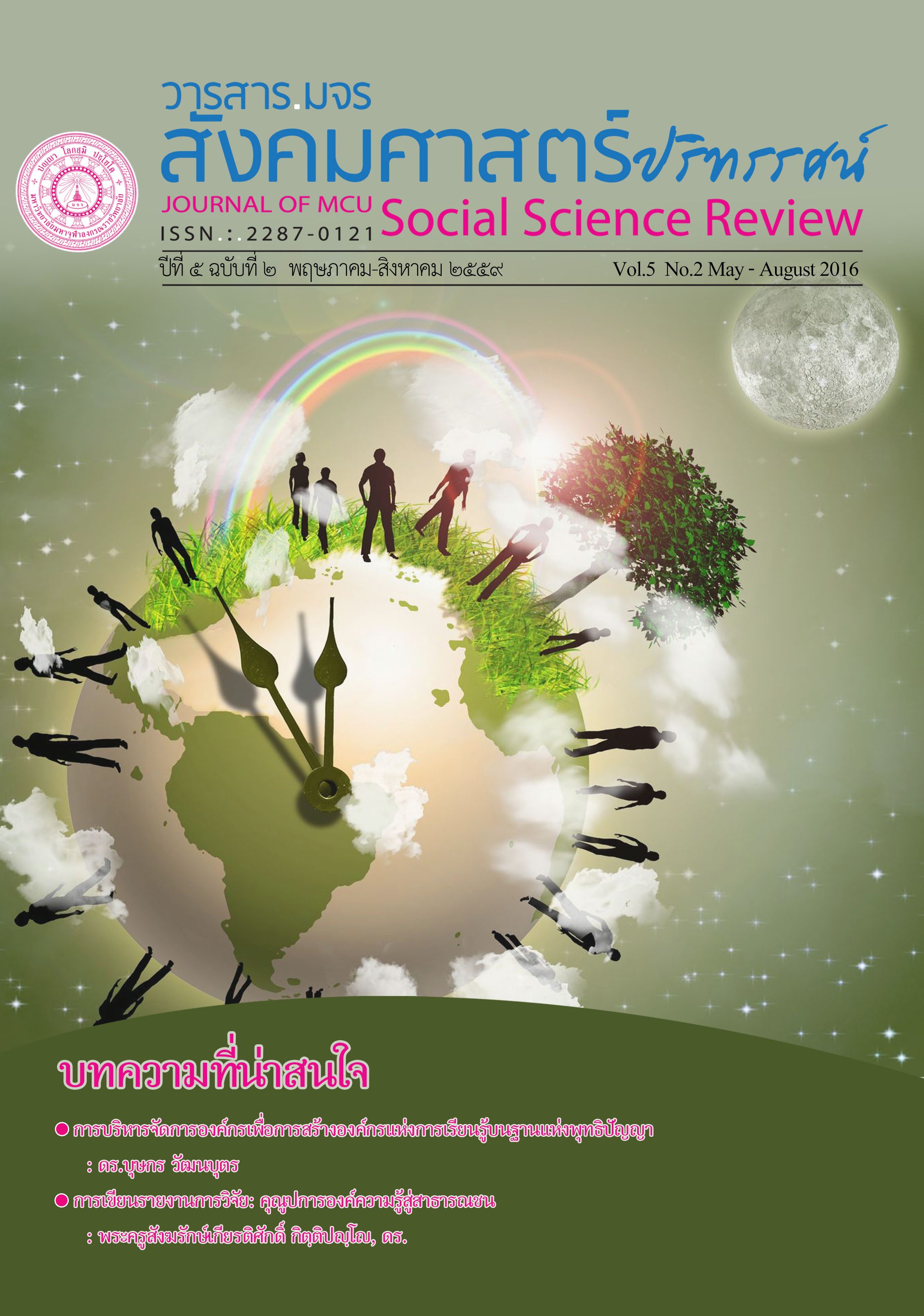การใช้ภาษาไทยถิ่นใต้ของนักเรียนในภาคใต้
คำสำคัญ:
ภาษาไทยกลาง, ภาษาไทยถิ่นใต้, ภาษามลายูท้องถิ่น (ยาวี), ทัศนคติต่อการใช้ภาษา, บริบท, นักเรียนภาคใต้บทคัดย่อ
บทความวิจัยนี้มีวัตถุประสงค์เพื่อศึกษาแนวโน้มของการใช้ภาษาไทยถิ่นใต้ ทัศนคติต่อการเลือกใช้ภาษาไทถิ่นใต้ ปัจจัยที่มีอิทธิพลต่อการใช้และไม่ใช้ภาษาไทยถิ่นใต้ในชีวิตประจำวันรวมทั้งบริบทของการใช้ภาษไทยกลางในภาคใต้ การศึกษานี้ใช้รูปแบบการศึกษาวิจัยเชิงปริมาณการศึกษาวิจัยเชิงคุณภาพ และการสัมภาษณ์รายบุคคล เก็บข้อมูลจากนักเรียนระดับประถมศึกษาและมัธยมศึกษาในโรงเรียนประจำจังหวัดของ ๑๔ จังหวัดภาคใต้ จำนวน ๑,๔๐๐ คนผลการวิจัยพบว่า นักเรียนในภาคใต้ใช้ภาษาไทยกลาง เฉลี่ยร้อยละ ๗๗.๗๔ ของการใช้ภาษา ในชีวิตประจำวันทั้หมด อายุเป็นปัจจัยสำคัญในการเลือกใช้ภาษาไทยกลาง ภาษาไทยถิ่นใต้และภาษามลายท้องถิ่น (ยาวี) กล่าวคือ นักเรียนระดับประถศึกษาใช้ภาษาไทยกลางมากกว่านักเรียนระดับมัธยมศึกษา ซึ่งสัมพันธ์กับอายุคือ ยิ่งอายุน้อยลงยิ่งใช้ภาษาไทยกลางมากขึ้นในขณะเดียวกันยิ่งอายุมากขึ้นก็ยิ่งใช้ภาษาไทยถิ่นใต้มากขึ้น ทั้งนี้นักเรียนมีทัศนคติที่ดีต่อการใช้ภาษาไทยถิ่นใต้ และเห็นว่าภาษาไทยถิ่นใต้มีประโยชน์ต่อการสื่อสาร ในชีวิตประจำวัน แต่ที่นักเรียนใช้ภาษไทยถิ่นใต้ลดลงเนื่องจากบริบทต่างๆ ในชีวิตประจำวันเอื้อต่อการใช้ภาษาไทยกลางมากกว่าภาษาไทยถิ่นใต้ จจุบันแม้จะมีการเปลี่ยนแปลงที่ทำให้บริบทการใช้ภาษาไทยกลางมีมากกว่าการใช้ภาษาไทยถิ่นใต้ จนส่งผลกระทบให้นักเรียนในภาคใต้ใช้ภาษาไทยกลางมากกว่าภาษไทยถิ่นใต้ แต่ทั้งนักเรียน ผู้ปกครอง และครู ต่งก็ต้องการให้มีการใช้ภาษาไทยถิ่นใต้ต่อไป
เอกสารอ้างอิง
กรุงเทพมหานคร: คุรุสภาลาดพร้าว, ๒๕๔๗.
(๒) วิทยานิพนธ์/รายงานวิจัย:
บงกช ฐนตคม. "การสลับภาษาระหว่างภาษไทยกลางและภาไทยถิ่นใต้ของนักศึกษาชาวใต้ ".
วิทยานิพนธ์ศิลปศาสตรมหาบัณฑิต สาขาวิชาภาษาศาสตร์, มหาวิทยาลัยธรรมศาสตร์,
๒๕๔๑.
ปรีชา ทิชินพงศ์. "การศึกษาเปรียบเทียบเจตคติของชาวไทยภาคกลางและชาวไทยภาคใต้ที่มีต่อผู้
พูดภาษาไทยกลางกับผู้พูดภาษาไทยถิ่นใต้". วิทยานิพนธ์ศิลปศาสตรมหาบัณฑิต
สาขาวิชามนุษยศาสตร์, มหาวิทยาลัยศรีนครินทรวิโรฒ สงขลา, ๒๕๓๕.
มนตรี มีเนียม และคณะ. "การสำรวจสภาพการใช้ภาษาของเยาวชนในภาคใต้ ". รายงานการวิจัย
มหาวิทยาลัยสงขลานครินทร์, ๒๕๕๖.
ยูทากะ โทมิโกะ. "ทัศนคติต่อภาษาและการเลือกภาษาของคนไทยอีสานที่มีอายุต่างกัน ".
วิทยานิพนธ์อักษรศาสตรมหาบัณฑิต สาขาวิชาภาษาศาสตร์, จุฬาลงกรณ์
มหาวิทยาลัย, ๒๕๕๒.
(๓) วารสาร:
ไข่มุก อุทยาวลี. "วิเคราะห์ปัญหาการจัดการศึกษาของรัฐที่มีต่อการบูรณาการทางสังคมและ
วัฒนธรรมในจังหวัดชายแดนภาคใต้ พ.ศ. ๒๔๖๐-๒๕๔๗". วารสารวิชาการคณะ
มนุษยศาสตร์และสังคมศาสตร์. ๕ (๑)ะ ๕๑-๘๒. ๒๕๕๒.
จริญญา ธรรมโชโต. "แนวโน้มของการเปลี่ยนแปลงคำศัพท์ในภาษาไทยถิ่นใต้ของคนสองกลุ่มอายุ
ในเขตอำเภอเมืองฯ จังหวัดตรัง". วารสารปาริชาต. ๑๓ (๒): ๓๗-๔๕. ๒๕๔๔.
เฉลิมชัย ส่งศรี. "ภาษไทยถิ่นใต้ในบริบททางวัฒนธรรม". วารสารปริชาต. ๑๑ (๒): ๔๗-๕๓.
๒๕๔๒.
(๔) สัมภาษณ์:
ชวน เพชแก้ว และจุมพล วัฒน์บุณย์. บทสัภาษณ์เกี่ยวกับการใช้ภาษาไทยกลางในอดีต.
วันที่ ๑๖ ตุลาคม พ.ศ. ๒๕๕๕.
(๕) สื่ออิเล็กทรอนิกส์/เว็บไซต์:
โยธิน แสวงดี. ระเบียบวิธีการวิจัยแบบผสม (Mixed Method). [ออนไลน์] แหล่งที่มา:
http://rlc.nrct.go.th/ewt_dl.php?nid=679. [๑๑ มีนาคม ๒๕๕๖].
ศาสวัต บุญศรี. ภาษาและสำเนียงท้องถิ่น: สินค้าวัฒนธรรมเทียม ๆ ปลอม ๆ ในสื่อบันเทิงไทย.
[ออนไลน์] แหล่งที่มา: http://prachatai.com/journaV/ 2012/04/40235. [๒๕
พฤษภาคม ๒๕๕๕].
๒. ภาษาอังกฤษ
(I) Books:
Labov, W. Sociolinguistic Patterns. The University of Pennsylvania Press, Philadelphia,
PA, 1972.
Richards, J. Dictionary of Applied Linguistics. Edinburgh: Longman, 1985.
Holmes, J. An Introduction to Sociolinguistics. Edinburgh: Pearson Education
Limited, 2008.
ดาวน์โหลด
เผยแพร่แล้ว
รูปแบบการอ้างอิง
ฉบับ
ประเภทบทความ
สัญญาอนุญาต
ลิขสิทธิ์ (c) 2016 วารสาร มจร สังคมศาสตร์ปริทรรศน์

อนุญาตภายใต้เงื่อนไข Creative Commons Attribution-NonCommercial-NoDerivatives 4.0 International License.
เพื่อให้เป็นไปตามกฎหมายลิขสิทธิ์ ผู้นิพนธ์ทุกท่านต้องลงลายมือชื่อในแบบฟอร์มใบมอบลิขสิทธิ์บทความให้แก่วารสารฯ พร้อมกับบทความต้นฉบับที่ได้แก้ไขครั้งสุดท้าย นอกจากนี้ ผู้นิพนธ์ทุกท่านต้องยืนยันว่าบทความต้นฉบับที่ส่งมาตีพิมพ์นั้น ได้ส่งมาตีพิมพ์เฉพาะในวารสาร มจร สังคมศาสตร์ปริทรรศน์ เพียงแห่งเดียวเท่านั้น หากมีการใช้ภาพหรือตารางหรือเนื้อหาอื่นๆ ของผู้นิพนธ์อื่นที่ปรากฏในสิ่งตีพิมพ์อื่นมาแล้ว ผู้นิพนธ์ต้องขออนุญาตเจ้าของลิขสิทธิ์ก่อน พร้อมทั้งแสดงหนังสือที่ได้รับการยินยอมต่อบรรณาธิการ ก่อนที่บทความจะได้รับการตีพิมพ์ หากไม่เป็นไปตามข้อกำหนดเบื้องต้น ทางวารสารจะถอดบทความของท่านออกโดยไม่มีข้อยกเว้นใดๆ ทั้งสิ้น





